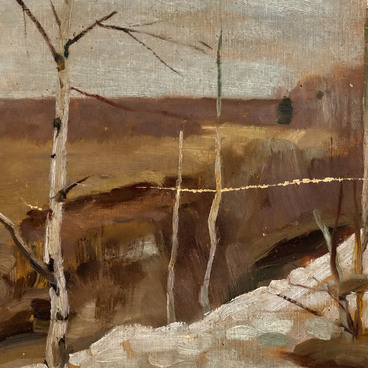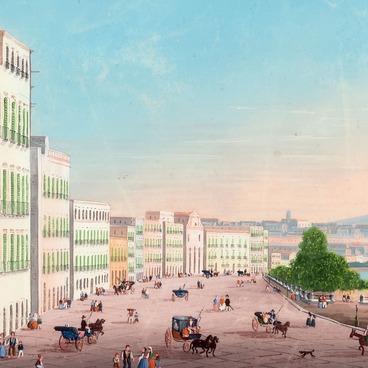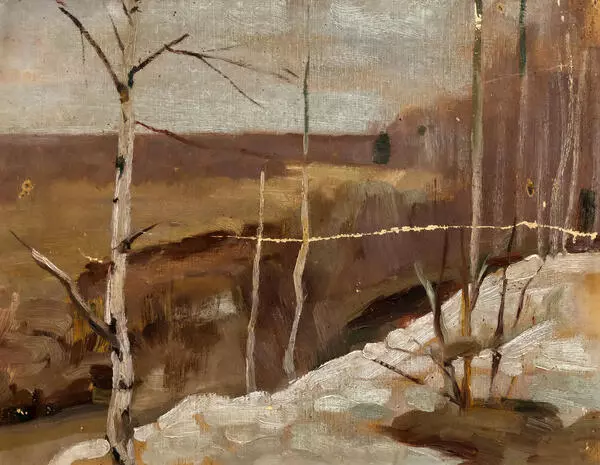The painting was done by Alexander Boratynskiy, the great-grandson of the poet Yevgeniy Boratynskiy, whom the family called Alec. He was a talented artist and musician, but he lived a very short life and did not have time to fulfill himself.
Alexander Boratynskiy was born in Kazan and studied painting under Alexander Fomin, a graduate of the Kazan Art School and the Higher Art School with the Academy of Arts. The teacher was a friend of the famous painter Nikolai Feshin and a much sought-after teacher. Painter Boris Rapoport, the student of Fomin, wrote: ‘His name means fidelity to art, search for harmony, continuous, selfless work with students’. The few surviving works of Alec indicate the undoubted influence of his teacher’s creative manner.
The most accurate image of Alek appears in the novel by Olga Ilyina-Boratynskaya “The Dawn of the Eighth Day”: “He paints more often a broken izbA or a broken fence or some nasty lame dog, but you stand and watch and look and you don”t know what is it that”s captivating you there. It feels like there”s something else in the drawing, something more. Because Alec is a real artist. And he draws not a dog, not izba, but his pity for the person and for the world, and his awe at it’.
In Kazan, Alek was part of the circle of artists meeting in the studio of Nadezhda Sapozhnikova, a student and muse of Nikolai Feshin. In 1918, he left from the first year of Kazan University and volunteered for the White Army. Alexander Boratynskiy went missing in action in 1919.
To date, only a few of his works have survived. After the capture of Kazan by the Red Army in September 1918 and the execution of Alek’s father, the Kazan house of Boratynskiy was vandalized and many paintings destroyed. One witness of these events recalled: “I will never forget Aunt Katya standing in front of Alec”s table, her frozen face, her trembling hands. There was chaos in the room, and she tried to put together one of the Alec”s landscapes torn by the soldiers - a white church wall and a young birch, pink in the rays of such a pure spring sunset’.
Alexander Boratynskiy was born in Kazan and studied painting under Alexander Fomin, a graduate of the Kazan Art School and the Higher Art School with the Academy of Arts. The teacher was a friend of the famous painter Nikolai Feshin and a much sought-after teacher. Painter Boris Rapoport, the student of Fomin, wrote: ‘His name means fidelity to art, search for harmony, continuous, selfless work with students’. The few surviving works of Alec indicate the undoubted influence of his teacher’s creative manner.
The most accurate image of Alek appears in the novel by Olga Ilyina-Boratynskaya “The Dawn of the Eighth Day”: “He paints more often a broken izbA or a broken fence or some nasty lame dog, but you stand and watch and look and you don”t know what is it that”s captivating you there. It feels like there”s something else in the drawing, something more. Because Alec is a real artist. And he draws not a dog, not izba, but his pity for the person and for the world, and his awe at it’.
In Kazan, Alek was part of the circle of artists meeting in the studio of Nadezhda Sapozhnikova, a student and muse of Nikolai Feshin. In 1918, he left from the first year of Kazan University and volunteered for the White Army. Alexander Boratynskiy went missing in action in 1919.
To date, only a few of his works have survived. After the capture of Kazan by the Red Army in September 1918 and the execution of Alek’s father, the Kazan house of Boratynskiy was vandalized and many paintings destroyed. One witness of these events recalled: “I will never forget Aunt Katya standing in front of Alec”s table, her frozen face, her trembling hands. There was chaos in the room, and she tried to put together one of the Alec”s landscapes torn by the soldiers - a white church wall and a young birch, pink in the rays of such a pure spring sunset’.




